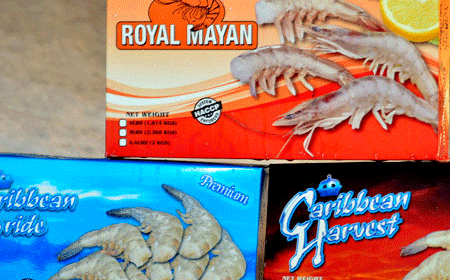BELIZE CITY, Mon. Nov. 16, 2015–Reports are indicating that the shrimp industry has suffered severe losses due to a bacteria known as “libya para humitas” that has somehow found its way into the ponds of the shrimp farms countrywide and killed large amounts of shrimp.
Alvin Henderson, president of the Shrimp Growers Association, said that the bacteria was first discovered in March of this year and by June it had infected most of the shrimp farms. Henderson said that there was very little they could have done to prevent the disease, which may have come from one of the neighboring Central American countries such as Mexico, Guatemala, or Honduras, where the bacteria have been known to affect their shrimp farms.
The Caribbean Shrimp Ltd. in Ladyville, which has been in operations since 1986 and is owned by Charles McIntosh, is the only shrimp farm that has not been affected by the disease. McIntosh told Amandala that he cannot say why his farm was not affected, but he did say that they grow their shrimp organically and don’t have as high a stocking density as a lot of the bigger farms.
McIntosh added, “We are a distance from the sea and our water comes in through a mangrove swamp; the mangroves are a nursery for all the other sea creatures; maybe they eat the bacteria before it gets to us.”
“Out of 100 acres of ponds, we get a thousand pounds per acre. We seldom completely dry out, since we only harvest half at a time,” said McIntosh.
McIntosh said that his farm harvests twice for the year and he has employed 23 people to work on his shrimp farm.
As many as 40% of the employees who work in the shrimp industry were laid off due to the disease, Henderson said.
Henderson said that the Shrimp Association is working along with the Ministry of Agriculture and Belize Agricultural Health Authority (BAHA) to see how quickly this crisis in the industry can be addressed. Henderson explained the sequence of measures that they are taking, which include genetic improvement (acquisition of a new genetic line of shrimps that are resistant to the bacteria); biological control, which involves introducing other bacteria to compete with the particular bacteria that is the source of the infection and losses; and changes in management practices, which include strategies to reduce the percentage of protein that is being used in the feed and enabling greater re-circulation of water on the production sites of the farms.
The losses to the shrimp industry are reportedly in the range of $30 million; however, with the efforts that are being put into solving the problem, the industry is expected to experience a recovery by early next year, Henderson said.

